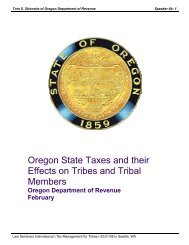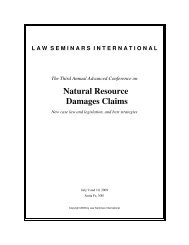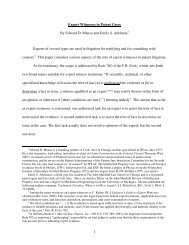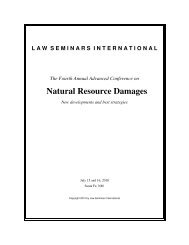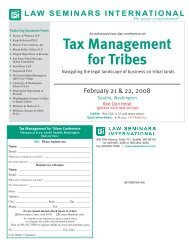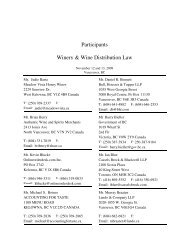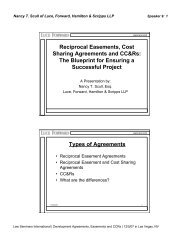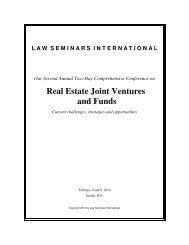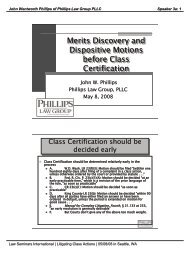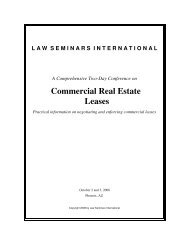Issues Relating to Leases on Native American Reservations
Issues Relating to Leases on Native American Reservations
Issues Relating to Leases on Native American Reservations
Create successful ePaper yourself
Turn your PDF publications into a flip-book with our unique Google optimized e-Paper software.
Speaker 17: D<strong>on</strong> J. Miner of Fennemore Craig P.C. Page 4<br />
V. JURISDICTION<br />
Determining the limits of tribal authority can be difficult. Not all <strong>Native</strong><br />
<strong>American</strong> property is located within the geographical boundaries of a reservati<strong>on</strong> and<br />
some property within a reservati<strong>on</strong> may be individually owned in fee. The term "Indian<br />
country" has evolved over time <str<strong>on</strong>g>to</str<strong>on</strong>g> refer <str<strong>on</strong>g>to</str<strong>on</strong>g> "the terri<str<strong>on</strong>g>to</str<strong>on</strong>g>ry set aside for the operati<strong>on</strong> of<br />
special rules allocating governmental power am<strong>on</strong>g Indian tribes, the federal<br />
governmental, and the states." COHEN'S, 135. The term was formally defined by<br />
C<strong>on</strong>gress in a federal criminal statute. See 18 U.S.C § 1151. Even though this definiti<strong>on</strong><br />
by its terms applies <str<strong>on</strong>g>to</str<strong>on</strong>g> specific secti<strong>on</strong>s of a criminal statute, the Supreme Court has also<br />
employed this term <str<strong>on</strong>g>to</str<strong>on</strong>g> determine the geographical reach of the supremacy of tribal law in<br />
certain civil c<strong>on</strong>texts. See AMERICAN INDIAN LAW DESKBOOK (1998, 2nd Ed.),<br />
36-37. Courts have defined Indian country broadly <str<strong>on</strong>g>to</str<strong>on</strong>g> include formal and informal<br />
reservati<strong>on</strong>s, dependant Indian communities and Indian allotments, whether restricted or<br />
held in trust by the United States.<br />
The state of Ariz<strong>on</strong>a has limited regula<str<strong>on</strong>g>to</str<strong>on</strong>g>ry authority over tribal lands within the<br />
state. The Ariz<strong>on</strong>a-New Mexico Enabling Act, by which C<strong>on</strong>gress allowed Ariz<strong>on</strong>a <str<strong>on</strong>g>to</str<strong>on</strong>g><br />
enter the United States, provides as follows:<br />
That the people inhabiting said proposed State do agree and declare that<br />
they forever disclaim all right and title <str<strong>on</strong>g>to</str<strong>on</strong>g> unappropriated and ungranted<br />
public lands lying within the boundaries thereof and <str<strong>on</strong>g>to</str<strong>on</strong>g> all lands lying<br />
within said boundaries owned or held by any Indian or Indian tribe, the<br />
right or title <str<strong>on</strong>g>to</str<strong>on</strong>g> which shall have been acquired through or from the United<br />
States or any prior sovereignty, and that until the title of such Indian or<br />
Indian tribe shall have been extinguished, the same shall be and remain<br />
subject <str<strong>on</strong>g>to</str<strong>on</strong>g> the dispositi<strong>on</strong> and under the absolute jurisdicti<strong>on</strong> and c<strong>on</strong>trol of<br />
the C<strong>on</strong>gress of the United States;<br />
Act of June 20, 1910, c. 310, 36 U.S. Stat. 557, 568-579, § 20. See also, Ariz. C<strong>on</strong>st. art.<br />
XX, § 4 (same language as above). However, the state does have limited regula<str<strong>on</strong>g>to</str<strong>on</strong>g>ry<br />
Law Seminars Internati<strong>on</strong>al | Commercial Real Estate <str<strong>on</strong>g>Leases</str<strong>on</strong>g> | 4/24/07<br />
4




